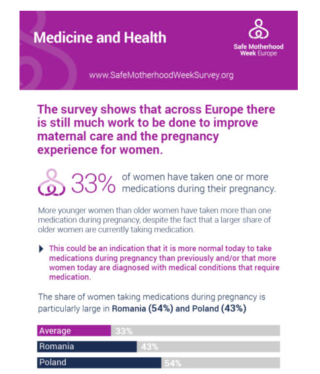A recent survey has found that a third of women across Europe have taken more than one medication during their pregnancy.
In addition, the ‘Perceptions of Pregnancy’ survey initiated by Safe Motherhood Week found that over 94 per cent of women surveyed did not have a trouble-free pregnancy experience. The report surveyed over 3,270 women across seven countries in Europe.
While the majority of women surveyed (65%) said they had not taken any medication during their pregnancy, significantly, 33% of women had taken one or more medications during their pregnancy. The proportion of women who had taken pregnancy was particularly high in Romania (54%) and Poland (43%).

Older women were more likely to take medication, and were more likely to have a chronic condition. Ten per cent reported suffering from a chronic illness such as asthma, diabetes, and pain, among others.
The authors of the report suggest that this could be as a result of changing mindsets regarding medication in pregnancy, and the perception that it is more acceptable now to take medication during pregnancy than it was previously. It may also be that more women are being diagnosed with co-morbid medical conditions in pregnancy nowadays, although they note both reasons are simply speculation and more in-depth research is needed on this topic.
The survey also illustrated the wide breadth of medications taken by women who are pregnant. Survey responders from the UK, Germany and Denmark discussed taking a wide array of different treatments; asthma medication, pain medicine, sertraline, the pill, eltroxin/thyroxine, citalopram, antidepressants, and blood pressure medicine were the most frequently mentioned.
“Sometimes doctors are reluctant to prescribe medicines that are really needed. Also, taking medication in the first trimester is more dangerous than in the second and third. In the next survey, we would like to know both what type of medication and when exactly it is taken during pregnancy,” commented Dr Jos Van Roosmalen, M.D., PhD., Professor of Safe Motherhood and Health Systems at Vrije Universiteit Amsterdam, who is a Safe Motherhood Week Expert Adviser.
The issue of medication in pregnancy was recently discussed by Dr Lode Dewulf, one of Safe Motherhood Week’s luminaries and long-term advocate for PMI, who was speaking at a symposium celebrating 25 years of Lareb, the Dutch Pharmacovigilance Centre.
Lareb is responsible for collecting and analysing reports of adverse reactions to medicines and vaccines. One of the key topics on the agenda was medicines in pregnancy, an indication of the significance of this issue from a public health perspective.
Dr Dewulf told the audience of academia, clinical practitioners, pharmacists, patient organisations and industry representatives about the importance of the patient perspective when evaluating the balance between the risks and benefits of medicines used during pregnancy.
During this session, Lareb announced details of a new initiative entitled pREGnant (www.pREGnant.nl), a registry designed to follow pregnancies and monitor the desired and undesired consequences of any medication used.
Lareb has the reputation of being one of the most innovative organisations of its kind in Europe, and its work is instrumental in monitoring global drug safety. Dr Dewulf commented that he is hopeful other countries will follow by example and “pay more attention to medicines in pregnancy” as a result.
